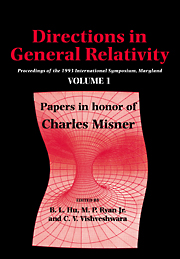 Directions in General Relativity
Directions in General Relativity Book contents
- Frontmatter
- Contents
- Contributors
- Symposium Program
- Papers from both Volumes Classified by Subject
- Preface
- Charles W. Misner: Insight and Discovery
- Remarks Concerning the Geometries of Gravity and Gauge Fields
- Gravity and Unification of Fundamental Interactions
- Minisuperspaces: Symmetries and Quantization
- Quantum Cosmology
- A Pictorial History of some Gravitational Instantons
- No Time Machines from Lightlike Sources in 2+1 Gravity
- Inhomogeneity and Anisotropy Generation in FRW Cosmologies
- Misner, Kinks and Black Holes
- The Quantum Mechanics of Closed Systems
- Cosmological Vacuum Phase Transitions
- Minisuperspace as a Quantum Open System
- Ricci Flow on Minisuperspaces and the Geometry-Topology Problem
- Classical and Quantum Dynamics of Black Hole Interiors
- Matter Time in Canonical Quantum Gravity
- The Isotropy and Homogeneity of the Universe
- Recent Advances in ADM Reduction
- Some Progress in Classical Canonical Gravity
- Harmonic Map Formulation of Colliding Electrovac Plane Waves
- Geometry, the Renormalization Group and Gravity
- An Example of Indeterminacy in the Time-Development of “Already Unified Field Theory”: A Collision between Electomagnetic Plane Waves
- Non-static Metrics of Hiscock-Gott Type
- Non-Standard Phase Space Variables, Quantization and Path-Integrals, or Little Ado about Much
- The Present Status of the Decaying Neutrino Theory
- Exploiting the Computer to Investigate Black Holes and Cosmic Censorship
- Misner Space as a Prototype for Almost Any Pathology
- Relativity and Rotation
- The First Law of Black Hole Mechanics
- Gravitational Radiation Antenna Observations
- The Back-Reaction is Never Negligible: Entropy of Black Holes and Radiation
- Toward a Thesis Topic
- Charles Misner: A Celebration of Memories
- Curriculum Vitae of C. W. Misner
- Ph. D. Theses supervised by C. W. Misner
- List of Publications of C. W. Misner
Quantum Cosmology
Published online by Cambridge University Press: 03 February 2010
- Frontmatter
- Contents
- Contributors
- Symposium Program
- Papers from both Volumes Classified by Subject
- Preface
- Charles W. Misner: Insight and Discovery
- Remarks Concerning the Geometries of Gravity and Gauge Fields
- Gravity and Unification of Fundamental Interactions
- Minisuperspaces: Symmetries and Quantization
- Quantum Cosmology
- A Pictorial History of some Gravitational Instantons
- No Time Machines from Lightlike Sources in 2+1 Gravity
- Inhomogeneity and Anisotropy Generation in FRW Cosmologies
- Misner, Kinks and Black Holes
- The Quantum Mechanics of Closed Systems
- Cosmological Vacuum Phase Transitions
- Minisuperspace as a Quantum Open System
- Ricci Flow on Minisuperspaces and the Geometry-Topology Problem
- Classical and Quantum Dynamics of Black Hole Interiors
- Matter Time in Canonical Quantum Gravity
- The Isotropy and Homogeneity of the Universe
- Recent Advances in ADM Reduction
- Some Progress in Classical Canonical Gravity
- Harmonic Map Formulation of Colliding Electrovac Plane Waves
- Geometry, the Renormalization Group and Gravity
- An Example of Indeterminacy in the Time-Development of “Already Unified Field Theory”: A Collision between Electomagnetic Plane Waves
- Non-static Metrics of Hiscock-Gott Type
- Non-Standard Phase Space Variables, Quantization and Path-Integrals, or Little Ado about Much
- The Present Status of the Decaying Neutrino Theory
- Exploiting the Computer to Investigate Black Holes and Cosmic Censorship
- Misner Space as a Prototype for Almost Any Pathology
- Relativity and Rotation
- The First Law of Black Hole Mechanics
- Gravitational Radiation Antenna Observations
- The Back-Reaction is Never Negligible: Entropy of Black Holes and Radiation
- Toward a Thesis Topic
- Charles Misner: A Celebration of Memories
- Curriculum Vitae of C. W. Misner
- Ph. D. Theses supervised by C. W. Misner
- List of Publications of C. W. Misner
Summary
INTRODUCTION
The presumed breakdown of the general theory of relativity (GTR) at the Planck scale without, as yet, a complete quantum theory of gravity (QG) to replace it is used to motivate consideration of a simpler problem—the quantum mechanics of cosmological models. In a pioneering paper, Misner (1969a) coined the term “quantum cosmology” (QC) for the quantization of the dynamical system whose degrees of freedom describe a spatially homogeneous universe. He also introduced the term “minisuperspace” (MSS) (Misner 1972) for the finite-dimensional configuration space of the dynamics of homogeneous cosmologies—a finite subspace of Wheeler's “superspace” (Wheeler 1968), the space of all three-geometries. The first invocation of quantized MSS models was that of DeWitt (1967) to apply Dirac (1958, 1959) quantization of gravity to a tractable system. He considered the closed Friedmann-Robertson-Walker (FRW) model (see Misner et al 1973). Misner (1969a, 1970, 1972) considered the application of Arnowitt, Deser, and Misner (1962) (ADM) quantization methods to the Bianchi Type cosmologies (e.g. Ryan and Shepley 1975, MacCallum 1975). In both treatments, it became clear that issues of time, factor ordering, and interpretation which plague the canonical quantization of gravity survive in the truncated models. It was, of course, recognized that, while perfectly valid as classical solutions to Einstein's equations, quantized cosmologies where degrees of freedom have been zeroed by hand need have no relation to a true QG theory. [A systematic attack on the validity of the MSS “approximation” has only recently begun (Kuchař and Ryan 1986, 1989).] Misner argued (1969a) that one might reasonably expect the quantum universe to be dominated by the dynamics of its spatially homogeneous mode.
- Type
- Chapter
- Information
- Directions in General RelativityProceedings of the 1993 International Symposium, Maryland: Papers in Honor of Charles Misner, pp. 43 - 57Publisher: Cambridge University PressPrint publication year: 1993
- 1
- Cited by


